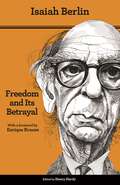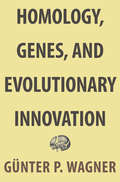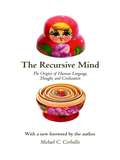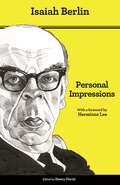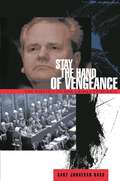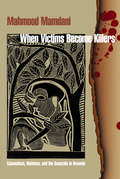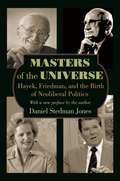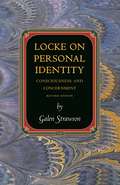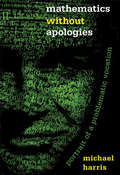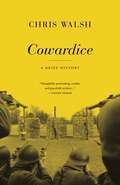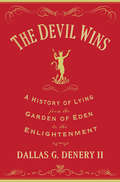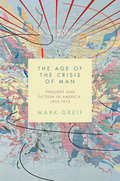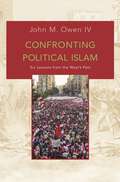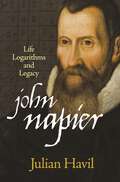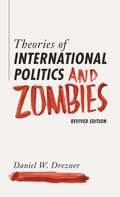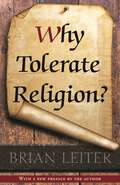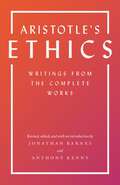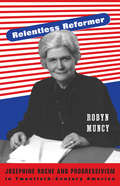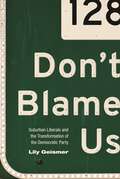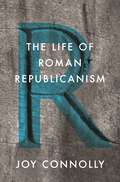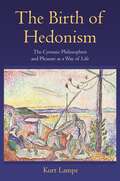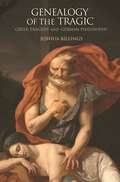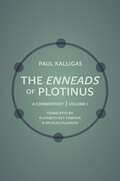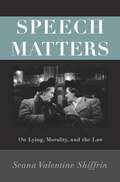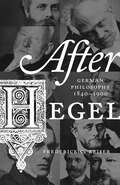- Table View
- List View
Freedom and Its Betrayal: Six Enemies of Human Liberty - Updated Edition
by Isaiah BerlinThese celebrated lectures constitute one of Isaiah Berlin's most concise, accessible, and convincing presentations of his views on human freedom—views that later found expression in such famous works as "Two Concepts of Liberty" and were at the heart of his lifelong work on the Enlightenment and its critics. When they were broadcast on BBC radio in 1952, the lectures created a sensation and confirmed Berlin’s reputation as an intellectual who could speak to the public in an appealing and compelling way. A recording of only one of the lectures has survived, but Henry Hardy has recreated them all here from BBC transcripts and Berlin’s annotated drafts. Hardy has also added, as an appendix to this new edition, a revealing text of "Two Concepts" based on Berlin’s earliest surviving drafts, which throws light on some of the issues raised by the essay. And, in a new foreword, historian Enrique Krauze traces the origin of Berlin’s idea of negative freedom to his rejection of the notion that the creation of the State of Israel left Jews with only two choices: to emigrate to Israel or to renounce Jewish identity.
Homology, Genes, and Evolutionary Innovation
by Günter P. WagnerA major synthesis of homology, written by a top researcher in the fieldHomology—a similar trait shared by different species and derived from common ancestry, such as a seal's fin and a bird’s wing—is one of the most fundamental yet challenging concepts in evolutionary biology. This groundbreaking book provides the first mechanistically based theory of what homology is and how it arises in evolution.Günter Wagner, one of the preeminent researchers in the field, argues that homology, or character identity, can be explained through the historical continuity of character identity networks—that is, the gene regulatory networks that enable differential gene expression. He shows how character identity is independent of the form and function of the character itself because the same network can activate different effector genes and thus control the development of different shapes, sizes, and qualities of the character. Demonstrating how this theoretical model can provide a foundation for understanding the evolutionary origin of novel characters, Wagner applies it to the origin and evolution of specific systems, such as cell types; skin, hair, and feathers; limbs and digits; and flowers.The first major synthesis of homology to be published in decades, Homology, Genes, and Evolutionary Innovation reveals how a mechanistically based theory can serve as a unifying concept for any branch of science concerned with the structure and development of organisms, and how it can help explain major transitions in evolution and broad patterns of biological diversity.
The Recursive Mind
by Michael C. CorballisThe Recursive Mind challenges the commonly held notion that language is what makes us uniquely human. In this compelling book, Michael Corballis argues that what distinguishes us in the animal kingdom is our capacity for recursion: the ability to embed our thoughts within other thoughts. "I think, therefore I am," is an example of recursive thought, because the thinker has inserted himself into his thought. Recursion enables us to conceive of our own minds and the minds of others. It also gives us the power of mental "time travel"--the ability to insert past experiences, or imagined future ones, into present consciousness. Drawing on neuroscience, psychology, animal behavior, anthropology, and archaeology, Corballis demonstrates how these recursive structures led to the emergence of language and speech, which ultimately enabled us to share our thoughts, plan with others, and reshape our environment to better reflect our creative imaginations. He shows how the recursive mind was critical to survival in the harsh conditions of the Pleistocene epoch, and how it evolved to foster social cohesion. He traces how language itself adapted to recursive thinking, first through manual gestures, then later, with the emergence of Homo sapiens, vocally. Toolmaking and manufacture arose, and the application of recursive principles to these activities in turn led to the complexities of human civilization, the extinction of fellow large-brained hominins like the Neandertals, and our species' supremacy over the physical world.Some images inside the book are unavailable due to digital copyright restrictions.
Personal Impressions: Updated Edition
by Isaiah BerlinIn this collection of remarkable biographical portraits, the great essayist and intellectual historian Isaiah Berlin brings to life a wide range of prominent twentieth-century thinkers, politicians, and writers. These include Winston Churchill, Franklin D. Roosevelt, Chaim Weizmann, Albert Einstein, Virginia Woolf, Aldous Huxley, Boris Pasternak, and Anna Akhmatova. With the exception of Roosevelt, Berlin met them all, and he knew many of them well. Other figures recalled here include the Zionist Yitzhak Sadeh, the U.S. Supreme Court judge Felix Frankfurter, the classicist and wit Maurice Bowra, the philosopher J. L. Austin, and the literary critic Edmund Wilson. For this edition, ten new pieces have been added, including portraits of David Ben-Gurion, Maynard and Lydia Keynes, and Stephen Spender, as well as Berlin's autobiographical reflections on Jewish Oxford and his Oxford undergraduate years. Rich and enlightening, Personal Impressions is a vibrant demonstration of Berlin’s belief that ideas truly live only through people.
Stay the Hand of Vengeance: The Politics of War Crimes Tribunals (Princeton Studies in International History and Politics #93)
by Gary Jonathan BassInternational justice has become a crucial part of the ongoing political debates about the future of shattered societies like Bosnia, Kosovo, Rwanda, Cambodia, and Chile. Why do our governments sometimes display such striking idealism in the face of war crimes and atrocities abroad, and at other times cynically abandon the pursuit of international justice altogether? Why today does justice seem so slow to come for war crimes victims in the Balkans? In this book, Gary Bass offers an unprecedented look at the politics behind international war crimes tribunals, combining analysis with investigative reporting and a broad historical perspective. The Nuremberg trials powerfully demonstrated how effective war crimes tribunals can be. But there have been many other important tribunals that have not been as successful, and which have been largely left out of today's debates about international justice. This timely book brings them in, using primary documents to examine the aftermath of the Napoleonic Wars, World War I, the Armenian genocide, World War II, and the recent wars in the former Yugoslavia. Bass explains that bringing war criminals to justice can be a military ordeal, a source of endless legal frustration, as well as a diplomatic nightmare. The book takes readers behind the scenes to see vividly how leaders like David Lloyd George, Winston Churchill, Franklin Roosevelt, and Bill Clinton have wrestled with these agonizing moral dilemmas. The book asks how law and international politics interact, and how power can be made to serve the cause of justice. Bass brings new archival research to bear on such events as the prosecution of the Armenian genocide, presenting surprising episodes that add to the historical record. His sections on the former Yugoslavia tell--with important new discoveries--the secret story of the politicking behind the prosecution of war crimes in Bosnia, drawing on interviews with senior White House officials, key diplomats, and chief prosecutors at the war crimes tribunal for the former Yugoslavia. Bass concludes that despite the obstacles, legalistic justice for war criminals is nonetheless worth pursuing. His arguments will interest anyone concerned about human rights and the pursuit of idealism in international politics.
When Victims Become Killers
by Mahmood Mamdani"When we captured Kigali, we thought we would face criminals in the state; instead, we faced a criminal population." So a political commissar in the Rwanda Patriotic Front reflected after the 1994 massacre of as many as one million Tutsis in Rwanda. Underlying his statement is the realization that, though ordered by a minority of state functionaries, the slaughter was performed by hundreds of thousands of ordinary citizens, including even judges, human rights activists, and doctors, nurses, priests, friends, and spouses of the victims. Indeed, it is its very popularity that makes the Rwandan genocide so unthinkable. This book makes it thinkable. Rejecting easy explanations of the genocide as a mysterious evil force that was bizarrely unleashed, one of Africa's best-known intellectuals situates the tragedy in its proper context. He coaxes to the surface the historical, geographical, and political forces that made it possible for so many Hutu to turn so brutally on their neighbors. He finds answers in the nature of political identities generated during colonialism, in the failures of the nationalist revolution to transcend these identities, and in regional demographic and political currents that reach well beyond Rwanda. In so doing, Mahmood Mamdani usefully broadens understandings of citizenship and political identity in postcolonial Africa. There have been few attempts to explain the Rwandan horror, and none has succeeded so well as this one. Mamdani's analysis provides a solid foundation for future studies of the massacre. Even more important, his answers point a way out of crisis: a direction for reforming political identity in central Africa and preventing future tragedies.
Masters of the Universe: Hayek, Friedman, and the Birth of Neoliberal Politics - Updated Edition
by Daniel Stedman JonesHow radical free-market ideas achieved mainstream dominance in postwar America and BritainBased on archival research and interviews with leading participants in the movement, Masters of the Universe traces the ascendancy of neoliberalism from the academy of interwar Europe to supremacy under Reagan and Thatcher and in the decades since. Daniel Stedman Jones argues that there was nothing inevitable about the victory of free-market politics. Far from being the story of the simple triumph of right-wing ideas, the neoliberal breakthrough was contingent on the economic crises of the 1970s and the acceptance of the need for new policies by the political left. This edition includes a new foreword in which the author addresses the relationship between intellectual history and the history of politics and policy.Fascinating, important, and timely, this is a book for anyone who wants to understand the history behind the Anglo-American love affair with the free market, as well as the origins of the current economic crisis.
Locke on Personal Identity: Consciousness and Concernment - Updated Edition (Princeton Monographs in Philosophy #42)
by Galen StrawsonJohn Locke's theory of personal identity underlies all modern discussion of the nature of persons and selves—yet it is widely thought to be wrong. In this book, Galen Strawson argues that in fact it is Locke’s critics who are wrong, and that the famous objections to his theory are invalid. Indeed, far from refuting Locke, they illustrate his fundamental point.Strawson argues that the root error is to take Locke’s use of the word "person" as merely a term for a standard persisting thing, like "human being." In actuality, Locke uses "person" primarily as a forensic or legal term geared specifically to questions about praise and blame, punishment and reward. This point is familiar to some philosophers, but its full consequences have not been worked out, partly because of a further error about what Locke means by the word "conscious." When Locke claims that your personal identity is a matter of the actions that you are conscious of, he means the actions that you experience as your own in some fundamental and immediate manner.Clearly and vigorously argued, this is an important contribution both to the history of philosophy and to the contemporary philosophy of personal identity.
Mathematics without Apologies
by Michael HarrisWhat do pure mathematicians do, and why do they do it? Looking beyond the conventional answers--for the sake of truth, beauty, and practical applications--this book offers an eclectic panorama of the lives and values and hopes and fears of mathematicians in the twenty-first century, assembling material from a startlingly diverse assortment of scholarly, journalistic, and pop culture sources.Drawing on his personal experiences and obsessions as well as the thoughts and opinions of mathematicians from Archimedes and Omar Khayyám to such contemporary giants as Alexander Grothendieck and Robert Langlands, Michael Harris reveals the charisma and romance of mathematics as well as its darker side. In this portrait of mathematics as a community united around a set of common intellectual, ethical, and existential challenges, he touches on a wide variety of questions, such as: Are mathematicians to blame for the 2008 financial crisis? How can we talk about the ideas we were born too soon to understand? And how should you react if you are asked to explain number theory at a dinner party?Disarmingly candid, relentlessly intelligent, and richly entertaining, Mathematics without Apologies takes readers on an unapologetic guided tour of the mathematical life, from the philosophy and sociology of mathematics to its reflections in film and popular music, with detours through the mathematical and mystical traditions of Russia, India, medieval Islam, the Bronx, and beyond.
Cowardice: A Brief History
by Chris WalshA provocative look at how cowardice has been understood from ancient times to the presentCoward. It's a grave insult, likely to provoke anger, shame, even violence. But what exactly is cowardice? When terrorists are called cowards, does it mean the same as when the term is applied to soldiers? And what, if anything, does cowardice have to do with the rest of us? Bringing together sources from court-martial cases to literary and film classics such as Dante's Inferno, The Red Badge of Courage, and The Thin Red Line, Cowardice recounts the great harm that both cowards and the fear of seeming cowardly have done, and traces the idea of cowardice’s power to its evolutionary roots. But Chris Walsh also shows that this power has faded, most dramatically on the battlefield. Misconduct that earlier might have been punished as cowardice has more recently often been treated medically, as an adverse reaction to trauma, and Walsh explores a parallel therapeutic shift that reaches beyond war, into the realms of politics, crime, philosophy, religion, and love.Yet, as Walsh indicates, the therapeutic has not altogether triumphed—contempt for cowardice endures, and he argues that such contempt can be a good thing. Courage attracts much more of our attention, but rigorously understanding cowardice may be more morally useful, for it requires us to think critically about our duties and our fears, and it helps us to act ethically when fear and duty conflict.Richly illustrated and filled with fascinating stories and insights, Cowardice is the first sustained analysis of a neglected but profound and pervasive feature of human experience.
The Devil Wins
by Dallas G. Denery IIIs it ever acceptable to lie? This question plays a surprisingly important role in the story of Europe's transition from medieval to modern society. According to many historians, Europe became modern when Europeans began to lie--that is, when they began to argue that it is sometimes acceptable to lie. This popular account offers a clear trajectory of historical progression from a medieval world of faith, in which every lie is sinful, to a more worldly early modern society in which lying becomes a permissible strategy for self-defense and self-advancement. Unfortunately, this story is wrong.For medieval and early modern Christians, the problem of the lie was the problem of human existence itself. To ask "Is it ever acceptable to lie?" was to ask how we, as sinners, should live in a fallen world. As it turns out, the answer to that question depended on who did the asking. The Devil Wins uncovers the complicated history of lying from the early days of the Catholic Church to the Enlightenment, revealing the diversity of attitudes about lying by considering the question from the perspectives of five representative voices--the Devil, God, theologians, courtiers, and women. Examining works by Augustine, Bonaventure, Martin Luther, Madeleine de Scudéry, Jean-Jacques Rousseau, and a host of others, Dallas G. Denery II shows how the lie, long thought to be the source of worldly corruption, eventually became the very basis of social cohesion and peace.
The Age of the Crisis of Man: Thought and Fiction in America, 1933–1973
by Mark GreifIn a midcentury American cultural episode forgotten today, intellectuals of all schools shared a belief that human nature was under threat. The immediate result was a glut of dense, abstract books on the "nature of man." But the dawning "age of the crisis of man," as Mark Greif calls it, was far more than a historical curiosity. In this ambitious intellectual and literary history, Greif recovers this lost line of thought to show how it influenced society, politics, and culture before, during, and long after World War II. During the 1930s and 1940s, fears of the barbarization of humanity energized New York intellectuals, Chicago protoconservatives, European Jewish émigrés, and native-born bohemians to seek "re-enlightenment," a new philosophical account of human nature and history. After the war this effort diffused, leading to a rebirth of modern human rights and a new power for the literary arts.Critics' predictions of a "death of the novel" challenged writers to invest bloodless questions of human nature with flesh and detail. Hemingway, Faulkner, and Richard Wright wrote flawed novels of abstract man. Succeeding them, Ralph Ellison, Saul Bellow, Flannery O'Connor, and Thomas Pynchon constituted a new guard who tested philosophical questions against social realities--race, religious faith, and the rise of technology--that kept difference and diversity alive.By the 1960s, the idea of "universal man" gave way to moral antihumanism, as new sensibilities and social movements transformed what had come before. Greif's reframing of a foundational debate takes us beyond old antagonisms into a new future, and gives a prehistory to the fractures of our own era.
Confronting Political Islam: Six Lessons from the West's Past
by John M. OwenHow the conflicts of Western history shed light on current upheavals in the Middle EastPolitical Islam has often been compared to ideological movements of the past such as fascism or Christian theocracy. But are such analogies valid? How should the Western world today respond to the challenges of political Islam? Taking an original approach to answer this question, Confronting Political Islam compares Islamism's struggle with secularism to other prolonged ideological clashes in Western history. By examining the past conflicts that have torn Europe and the Americas—and how they have been supported by underground networks, fomented radicalism and revolution, and triggered foreign interventions and international conflicts—John Owen draws six major lessons to demonstrate that much of what we think about political Islam is wrong.Owen focuses on the origins and dynamics of twentieth-century struggles among Communism, Fascism, and liberal democracy; the late eighteenth- and nineteenth-century contests between monarchism and republicanism; and the sixteenth- and seventeenth-century wars of religion between Catholics, Lutherans, Calvinists, and others. Owen then applies principles learned from the successes and mistakes of governments during these conflicts to the contemporary debates embroiling the Middle East. He concludes that ideological struggles last longer than most people presume; ideologies are not monolithic; foreign interventions are the norm; a state may be both rational and ideological; an ideology wins when states that exemplify it outperform other states across a range of measures; and the ideology that wins may be a surprise.Looking at the history of the Western world itself and the fraught questions over how societies should be ordered, Confronting Political Islam upends some of the conventional wisdom about the current upheavals in the Muslim world.
John Napier: Life, Logarithms, and Legacy
by Julian HavilThe most comprehensive account of the mathematician's life and workJohn Napier (1550–1617) is celebrated today as the man who invented logarithms—an enormous intellectual achievement that would soon lead to the development of their mechanical equivalent in the slide rule: the two would serve humanity as the principal means of calculation until the mid-1970s. Yet, despite Napier's pioneering efforts, his life and work have not attracted detailed modern scrutiny. John Napier is the first contemporary biography to take an in-depth look at the multiple facets of Napier’s story: his privileged position as the eighth Laird of Merchiston and the son of influential Scottish landowners; his reputation as a magician who dabbled in alchemy; his interest in agriculture; his involvement with a notorious outlaw; his staunch anti-Catholic beliefs; his interactions with such peers as Henry Briggs, Johannes Kepler, and Tycho Brahe; and, most notably, his estimable mathematical legacy.Julian Havil explores Napier’s original development of logarithms, the motivations for his approach, and the reasons behind certain adjustments to them. Napier’s inventive mathematical ideas also include formulas for solving spherical triangles, "Napier’s Bones" (a more basic but extremely popular alternative device for calculation), and the use of decimal notation for fractions and binary arithmetic. Havil also considers Napier’s study of the Book of Revelation, which led to his prediction of the Apocalypse in his first book, A Plaine Discovery of the Whole Revelation of St. John—the work for which Napier believed he would be most remembered.John Napier assesses one man’s life and the lasting influence of his advancements on the mathematical sciences and beyond.
Theories of International Politics and Zombies: Revived Edition
by Daniel W. DreznerHow international relations theory can be applied to a zombie invasionWhat would happen to international politics if the dead rose from the grave and started to eat the living? Daniel Drezner's groundbreaking book answers the question that other international relations scholars have been too scared to ask. Addressing timely issues with analytical bite, Drezner looks at how well-known theories from international relations might be applied to a war with zombies. Exploring the plots of popular zombie films, songs, and books, Theories of International Politics and Zombies predicts realistic scenarios for the political stage in the face of a zombie threat and considers how valid—or how rotten—such scenarios might be.This newly revived edition includes substantial updates throughout as well as a new epilogue assessing the role of the zombie analogy in the public sphere.
Why Tolerate Religion?: Updated Edition
by Brian LeiterWhy it's wrong to single out religious liberty for special legal protectionsThis provocative book addresses one of the most enduring puzzles in political philosophy and constitutional theory—why is religion singled out for preferential treatment in both law and public discourse? Why are religious obligations that conflict with the law accorded special toleration while other obligations of conscience are not? In Why Tolerate Religion?, Brian Leiter shows why our reasons for tolerating religion are not specific to religion but apply to all claims of conscience, and why a government committed to liberty of conscience is not required by the principle of toleration to grant exemptions to laws that promote the general welfare.
Aristotle's Ethics: Writings from the Complete Works - Revised Edition
by AristotleAristotle's moral philosophy is a pillar of Western ethical thought. It bequeathed to the world an emphasis on virtues and vices, happiness as well-being or a life well lived, and rationally motivated action as a mean between extremes. Its influence was felt well beyond antiquity into the Middle Ages, particularly through the writings of St. Thomas Aquinas. In the past century, with the rise of virtue theory in moral philosophy, Aristotle’s ethics has been revived as a source of insight and interest. While most attention has traditionally focused on Aristotle’s famous Nicomachean Ethics, there are several other works written by or attributed to Aristotle that illuminate his ethics: the Eudemian Ethics, the Magna Moralia, and Virtues and Vices.This book brings together all four of these important texts, in thoroughly revised versions of the translations found in the authoritative complete works universally recognized as the standard English edition. Edited and introduced by two of the world’s leading scholars of ancient philosophy, this is an essential volume for anyone interested in the ethical thought of one of the most important philosophers in the Western tradition.
Relentless Reformer: Josephine Roche and Progressivism in Twentieth-Century America (Politics and Society in Modern America #108)
by Robyn MuncyJosephine Roche (1886–1976) was a progressive activist, New Deal policymaker, and businesswoman. As a pro-labor and feminist member of Franklin D. Roosevelt's administration, she shaped the founding legislation of the U.S. welfare state and generated the national conversation about health-care policy that Americans are still having today. In this gripping biography, Robyn Muncy offers Roche’s persistent progressivism as evidence for surprising continuities among the Progressive Era, the New Deal, and the Great Society.Muncy explains that Roche became the second-highest-ranking woman in the New Deal government after running a Colorado coal company in partnership with coal miners themselves. Once in office, Roche developed a national health plan that was stymied by World War II but enacted piecemeal during the postwar period, culminating in Medicare and Medicaid in the 1960s. By then, Roche directed the United Mine Workers of America Welfare and Retirement Fund, an initiative aimed at bolstering the labor movement, advancing managed health care, and reorganizing medicine to facilitate national health insurance, one of Roche’s unrealized dreams.In Relentless Reformer, Muncy uses Roche’s dramatic life story—from her stint as Denver’s first policewoman in 1912 to her fight against a murderous labor union official in 1972—as a unique vantage point from which to examine the challenges that women have faced in public life and to reassess the meaning and trajectory of progressive reform.
Don't Blame Us: Suburban Liberals and the Transformation of the Democratic Party (Politics and Society in Modern America #109)
by Lily GeismerDon't Blame Us traces the reorientation of modern liberalism and the Democratic Party away from their roots in labor union halls of northern cities to white-collar professionals in postindustrial high-tech suburbs, and casts new light on the importance of suburban liberalism in modern American political culture. Focusing on the suburbs along the high-tech corridor of Route 128 around Boston, Lily Geismer challenges conventional scholarly assessments of Massachusetts exceptionalism, the decline of liberalism, and suburban politics in the wake of the rise of the New Right and the Reagan Revolution in the 1970s and 1980s. Although only a small portion of the population, knowledge professionals in Massachusetts and elsewhere have come to wield tremendous political leverage and power. By probing the possibilities and limitations of these suburban liberals, this rich and nuanced account shows that—far from being an exception to national trends—the suburbs of Massachusetts offer a model for understanding national political realignment and suburban politics in the second half of the twentieth century.
The Life of Roman Republicanism
by Joy ConnollyIn recent years, Roman political thought has attracted increased attention as intellectual historians and political theorists have explored the influence of the Roman republic on major thinkers from the Renaissance to the Enlightenment. Held up as a "third way" between liberalism and communitarianism, neo-Roman republicanism promises useful, persuasive accounts of civic virtue, justice, civility, and the ties that bind citizens. But republican revivalists, embedded in modern liberal, democratic, and constitutional concerns, almost never engage closely with Roman texts. The Life of Roman Republicanism takes up that challenge.With an original combination of close reading and political theory, Joy Connolly argues that Cicero, Sallust, and Horace inspire fresh thinking about central concerns of contemporary political thought and action. These include the role of conflict in the political community, especially as it emerges from class differences; the necessity of recognition for an equal and just society; the corporeal and passionate aspects of civic experience; citizens' interdependence on one another for senses of selfhood; and the uses and dangers of self-sovereignty and fantasy. Putting classicists and political theorists in dialogue, the book also addresses a range of modern thinkers, including Kant, Hannah Arendt, Stanley Cavell, and Philip Pettit. Together, Connolly's readings construct a new civic ethos of advocacy, self-criticism, embodied awareness, imagination, and irony.
The Birth of Hedonism: The Cyrenaic Philosophers and Pleasure as a Way of Life
by Kurt LampeAccording to Xenophon, Socrates tried to persuade his associate Aristippus to moderate his excessive indulgence in wine, women, and food, arguing that only hard work can bring happiness. Aristippus wasn't convinced. Instead, he and his followers espoused the most radical form of hedonism in ancient Western philosophy. Before the rise of the better known but comparatively ascetic Epicureans, the Cyrenaics pursued a way of life in which moments of pleasure, particularly bodily pleasure, held the highest value. In The Birth of Hedonism, Kurt Lampe provides the most comprehensive account in any language of Cyrenaic ideas and behavior, revolutionizing the understanding of this neglected but important school of philosophy.The Birth of Hedonism thoroughly and sympathetically reconstructs the doctrines and practices of the Cyrenaics, who were active between the fourth and third centuries BCE. The book examines not only Aristippus and the mainstream Cyrenaics, but also Hegesias, Anniceris, and Theodorus. Contrary to recent scholarship, the book shows that the Cyrenaics, despite giving primary value to discrete pleasurable experiences, accepted the dominant Greek philosophical belief that life-long happiness and the virtues that sustain it are the principal concerns of ethics. The book also offers the first in-depth effort to understand Theodorus's atheism and Hegesias's pessimism, both of which are extremely unusual in ancient Greek philosophy and which raise the interesting question of hedonism's relationship to pessimism and atheism. Finally, the book explores the "new Cyrenaicism" of the nineteenth-century writer and classicist Walter Pater, who drew out the enduring philosophical interest of Cyrenaic hedonism more than any other modern thinker.
Genealogy of the Tragic: Greek Tragedy and German Philosophy
by Joshua BillingsWhy did Greek tragedy and "the tragic" come to be seen as essential to conceptions of modernity? And how has this belief affected modern understandings of Greek drama? In Genealogy of the Tragic, Joshua Billings answers these and related questions by tracing the emergence of the modern theory of the tragic, which was first developed around 1800 by thinkers associated with German Idealism. The book argues that the idea of the tragic arose in response to a new consciousness of history in the late eighteenth century, which spurred theorists to see Greek tragedy as both a unique, historically remote form and a timeless literary genre full of meaning for the present. The book offers a new interpretation of the theories of Schiller, Schelling, Hegel, Hölderlin, and others, as mediations between these historicizing and universalizing impulses, and shows the roots of their approaches in earlier discussions of Greek tragedy in Germany, France, and England. By examining eighteenth-century readings of tragedy and the interactions between idealist thinkers in detail, Genealogy of the Tragic offers the most comprehensive historical account of the tragic to date, as well as the fullest explanation of why and how the idea was used to make sense of modernity. The book argues that idealist theories remain fundamental to contemporary interpretations of Greek tragedy, and calls for a renewed engagement with philosophical questions in criticism of tragedy.
The Enneads of Plotinus, Volume 1: A Commentary
by Paul KalligasThe first volume in a landmark commentary on an important and influential work of ancient philosophyThis is the first volume of a groundbreaking commentary on one of the most important works of ancient philosophy, the Enneads of Plotinus—a text that formed the basis of Neoplatonism and had a deep influence on early Christian thought and medieval and Renaissance philosophy. This volume covers the first three of the six Enneads, as well as Porphyry's Life of Plotinus, a document in which Plotinus’s student—the collector and arranger of the Enneads—introduces the philosopher and his work. A landmark contribution to modern Plotinus scholarship, Paul Kalligas’s commentary is the most detailed and extensive ever written for the whole of the Enneads.For each of the treatises in the first three Enneads, Kalligas provides a brief introduction that presents the philosophical background against which Plotinus’s contribution can be assessed; a synopsis giving the main lines and the articulation of the argument; and a running commentary placing Plotinus’s thought in its intellectual context and making evident the systematic association of its various parts with each other.
Speech Matters: On Lying, Morality, and the Law (Carl G. Hempel Lecture Series #4)
by Seana Valentine ShiffrinTo understand one another as individuals and to fulfill the moral duties that require such understanding, we must communicate with each other. We must also maintain protected channels that render reliable communication possible, a demand that, Seana Shiffrin argues, yields a prohibition against lying and requires protection for free speech. This book makes a distinctive philosophical argument for the wrong of the lie and provides an original account of its difference from the wrong of deception.Drawing on legal as well as philosophical arguments, the book defends a series of notable claims—that you may not lie about everything to the "murderer at the door," that you have reasons to keep promises offered under duress, that lies are not protected by free speech, that police subvert their mission when they lie to suspects, and that scholars undermine their goals when they lie to research subjects.Many philosophers start to craft moral exceptions to demands for sincerity and fidelity when they confront wrongdoers, the pressures of non-ideal circumstances, or the achievement of morally substantial ends. But Shiffrin consistently resists this sort of exceptionalism, arguing that maintaining a strong basis for trust and reliable communication through practices of sincerity, fidelity, and respecting free speech is an essential aspect of ensuring the conditions for moral progress, including our rehabilitation of and moral reconciliation with wrongdoers.
After Hegel: German Philosophy, 1840–1900
by Frederick C. BeiserHistories of German philosophy in the nineteenth century typically focus on its first half—when Hegel, idealism, and Romanticism dominated. By contrast, the remainder of the century, after Hegel's death, has been relatively neglected because it has been seen as a period of stagnation and decline. But Frederick Beiser argues that the second half of the century was in fact one of the most revolutionary periods in modern philosophy because the nature of philosophy itself was up for grabs and the very absence of certainty led to creativity and the start of a new era. In this innovative concise history of German philosophy from 1840 to 1900, Beiser focuses not on themes or individual thinkers but rather on the period’s five great debates: the identity crisis of philosophy, the materialism controversy, the methods and limits of history, the pessimism controversy, and the Ignorabimusstreit. Schopenhauer and Wilhelm Dilthey play important roles in these controversies but so do many neglected figures, including Ludwig Büchner, Eugen Dühring, Eduard von Hartmann, Julius Fraunstaedt, Hermann Lotze, Adolf Trendelenburg, and two women, Agnes Taubert and Olga Pluemacher, who have been completely forgotten in histories of philosophy. The result is a wide-ranging, original, and surprising new account of German philosophy in the critical period between Hegel and the twentieth century.
